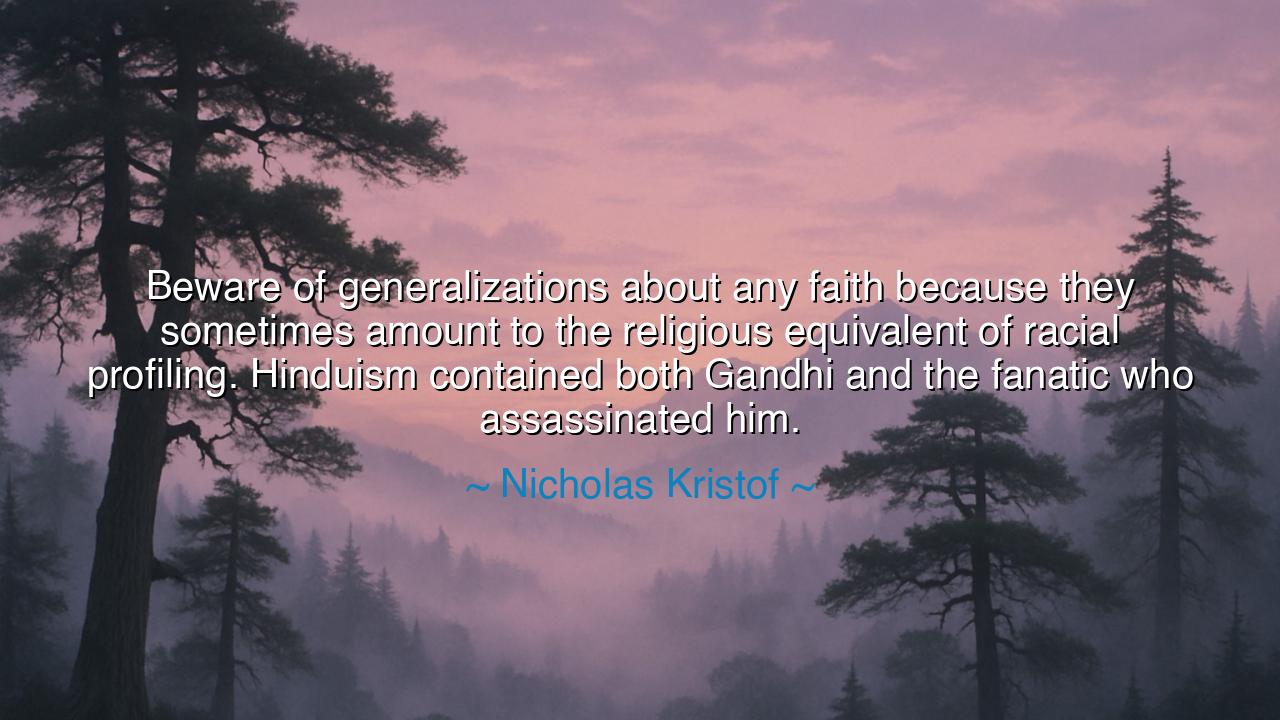
Beware of generalizations about any faith because they sometimes
Beware of generalizations about any faith because they sometimes amount to the religious equivalent of racial profiling. Hinduism contained both Gandhi and the fanatic who assassinated him.






Host: The air in the room is thick with the weight of the conversation. The dim light from the corner lamp barely reaches their faces, leaving shadows that dance on the walls as Jack and Jeeny sit across from each other, each deeply considering the implications of the quote. The night outside is quiet, with only the faint hum of the city in the distance. The quote—“Beware of generalizations about any faith because they sometimes amount to the religious equivalent of racial profiling. Hinduism contained both Gandhi and the fanatic who assassinated him.”—hangs in the air like a subtle tension. Jack, his gaze sharp, glances at Jeeny, as if weighing the complexity of the statement. Jeeny, calm but with a glint of thought in her eyes, waits for him to speak.
Jack: (his voice measured, almost skeptical) “You know, I can understand the point that Kristof is trying to make here. Generalizing any faith can be dangerous because it strips away the nuances of humanity within it. But I can’t help but feel like he’s oversimplifying it a bit. Sure, any faith has its extremes, but religions are more complex than just two sides—Gandhi and the fanatic who killed him.”
Jeeny: (her voice calm, but with conviction) “I think that’s exactly the point he’s trying to make, Jack. By pointing out the contrast between Gandhi and the assassin, he’s showing how faith can be interpreted in vastly different ways. Both actions, for instance, come from a place of devotion, but they lead to completely different outcomes. What I think Kristof is warning against is the danger of grouping everyone within a religion into a single narrative, ignoring the individual diversity and complexity that exists.”
Jack: (pausing, his tone questioning) “But doesn’t that open up a can of worms? If we say there’s no clear line between the peaceful and the violent within a religion, aren’t we just accepting every interpretation as valid? There has to be a distinction between what a religion teaches and how people use it to justify violent actions.”
Jeeny: (nodding slowly, her tone thoughtful) “I don’t think Kristof is saying all interpretations are equally valid, Jack. What he’s saying is that generalizing an entire religion, especially based on the actions of a few, is not only inaccurate—it’s dangerous. Take Hinduism, for example. It’s the faith of Gandhi, a man who fought for peace, but it’s also the faith of someone who used violence to further their own ideology. The problem isn’t with Hinduism—it’s with extremism, which can crop up in any belief system.”
Jack: (his voice introspective, almost sarcastic) “Sure, but isn't it hard to separate the two sometimes? When a fanatic acts in the name of a religion, how do we distinguish that from what the religion actually stands for? Isn’t there a fine line between interpretation and manipulation?”
Jeeny: (leaning forward, her voice firm) “Exactly, and that’s what makes it so dangerous to make sweeping generalizations. Faiths are constantly interpreted, and while some interpretations can be twisted into something harmful, it doesn’t mean the core beliefs are flawed. We need to challenge extremism—not the entire religion it’s born from. The issue isn’t faith, it’s misuse of it.”
Host: The tension between them grows. Jack’s expression hardens, a furrowed brow reflecting his struggle to reconcile his thoughts, while Jeeny’s gaze remains steady, her tone calm but unwavering. Outside, the world seems to stand still, their words the only movement in the room.
Jack: (his voice sharper, almost challenging) “So, you think we should just accept that every faith, no matter how it’s used, is essentially the same? That’s a pretty idealistic view, Jeeny. Don’t you think some religions, when you look at their history, have more to answer for than others?”
Jeeny: (her voice passionate, but grounded) “No, Jack, I’m not saying all religions are the same. What I’m saying is that all religions have a human element—they can be interpreted for both good and bad. But to stereotype them as inherently violent or oppressive because of how a few people use them? That’s where we’re losing the real meaning. The essence of every religion isn’t about violence—it’s about peace, love, compassion. The question is, are we able to recognize the good in these faiths, or are we too focused on the extremes?”
Host: The room seems to hold its breath. Jack leans back, a slight exhale escaping his lips as he processes her words. Jeeny watches him, her expression steady, yet vulnerable in its honesty. Outside, the faint light of the city flickers as the night settles deeper into stillness.
Jack: (his voice softened, more reflective) “I get it now. It’s not about blindly accepting all interpretations, but recognizing that extremism and violence come from the distortion of faith, not its essence. Maybe we’ve spent so much time focusing on the negative that we’ve lost sight of the positive impact a religion can have on someone’s life.”
Jeeny: (nodding, her tone gentle, almost relieved) “Exactly. We’re all humans, and we’re prone to misusing things—faith, power, even love. But the true test is in how we choose to interpret those things. Faith, when used for good, can be one of the most powerful forces for change, for love, for unity.”
Host: The room feels lighter now, the tension dissolving as both Jack and Jeeny reach an understanding. The conversation, once sharp and probing, now takes on a more calm, introspective tone. The faint glow from the window casts a soft light across the room as they sit in quiet recognition of the complexity and nuance inherent in religion, faith, and the human spirit.






AAdministratorAdministrator
Welcome, honored guests. Please leave a comment, we will respond soon